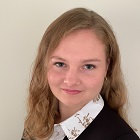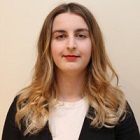When it comes to solving health-care problems, medicine isn’t the only answer.
In fact, the Schulich-Ivey Quality in Healthcare Consultancy course, offered by Schulich School of Medicine & Dentistry and Ivey, is proving that collaborations between those in medicine and business can lead to innovative health-care solutions. The 24-week course pairs teams of Ivey HBA students with medical professionals to work on health-care quality improvement projects with guidance from both Schulich and Ivey faculty and insights from guest lecturers.
“Since we aren’t physicians, we come in with a fresh perspective and can question why things are done this way,” said Caroline Parsons, an HBA ’23 candidate who was in the 2021-22 course. “One of the things we’re taught at Ivey is the importance of having diverse perspectives.”
Making an impact
The students’ projects have led to some impressive quality improvements for the London, Ontario health-care system over the years. Some examples include reducing time in hospital post-liver transplant, and increasing the weekly number of transcatheter aortic valve implantations. Originally launched in 2018 by three London Health Sciences Centre clinicians, the course is now led by Dr. Alan Gob, Clinical Lead and Education Lead at the Centre for Quality, Innovation, and Safety (CQUINS) and Associate Professor with Western University’s Department of Medicine, with support from Joan Binnendyk, Curriculum Specialist with CQUINS.
Plans are now underway to grow the health-care consultancy course through sponsorship so that more students can participate. The course most recently had 24 students working in teams of four, each paired with one of six clinicians. Another goal is to bring in additional community-based health professionals outside of London to broaden the course’s network and impact.
Applying a new lens to health care
Parsons, along with Mila Gracic, an HBA/Medical Sciences ’24 candidate who also recently completed the course, are Co-Vice Presidents of the Schulich-Ivey Quality in Healthcare Consultancy Team, which will plan the 2022-23 course and support its participants. In addition to lining up guest lecturers, Parsons and Gracic hope to recruit students from a variety of HBA dual-degree programs for the course to further increase the diversity of perspectives.
“It really transforms your view when you work with individuals from other programs. We saw the value of having HBA students with backgrounds in health sciences, medical sciences, and general sciences working together so our goal is to bring in students with different backgrounds,” said Gracic.
Both experienced how bringing a new lens to health care leads to innovative ideas. Gracic’s team found ways to increase MRI access for cancer patients, while Parson’s team developed a list of patient indicators that might allow some liver transplant recipients to fast-track through recovery care. Their projects both won awards at the course’s final capstone presentation event, which was judged by a panel of Western University faculty and industry leaders. Below they share what the experience meant to them.
Caroline Parsons,  HBA ’23 candidate
HBA ’23 candidate
Project: Increasing the rate of fast-track recovery in post-liver transplant recipients (with Dr. Nelson Gonzalez, an anesthesiologist at London Health Sciences Centre)
Caroline Parsons, a Western BSc Medical Sciences graduate, had always been interested in working in health care. But after taking business courses, she was intrigued by how the fields could mesh. The health-care consultancy course was an opportunity to bring those areas together.
“The course was like doing a specialization in quality improvement. It touched on a lot of the different courses that we took at Ivey, but through a health-care lens,” she said.
While looking for ways to improve the quality of care for liver transplant recipients, her team also learned how to communicate with diverse stakeholders.
“When you are trying to present something that will lead to a cultural change, the way you communicate the goals can have a big impact. The experience allowed us to really develop our communication skills,” she said.
As Parsons learned about the many elements of business that can be applied to medicine, she became interested in health-care analytics and enrolled in Ivey's MSc in Business Analytics program, which she will begin this fall.
Most importantly, the course allowed her to see how she can use her skills and knowledge to make a difference.
Ivey very much tries to empower you to make change in the world and to have an impact and this project shows us that we can do just that.”
– Caroline Parsons
 Mila Gracic, HBA/Medical Sciences ’24 candidate
Mila Gracic, HBA/Medical Sciences ’24 candidate
Project: Increasing access to MRI for radiotherapy treatment planning at a large tertiary cancer centre (with Dr. Robert Dinniwell, Division Chair, Radiation Oncology, London Health Sciences Centre)
Mila Gracic took the health-care consultancy course because she’s hoping to pursue a career in health-care consulting or do strategy work for a health-care firm. Through the course, she saw how her knowledge of strategy and the analytical and decision-making skills gained at Ivey can be applied to health-care problems. Her team particularly saw the value of tackling the MRI access project through an operational lens.
“Ivey taught us to ask, So what? Why is this important? What will be the outcome?, and such questions lead to percolation of thought,” she said. “As students, we don’t often get to see what we can do with our knowledge and how we can make an impact at this stage. The projects showed us that our input, whether large or small, is creating a change that will accumulate over time.”
Gracic said the clinicians were also interested in learning business skills from the students and she hopes more physicians will take advantage of this opportunity to learn how the concepts of quality improvement can be applied in health care.
The learning environment was very positive for both the students and the clinicians. I hope more physicians will reach out to us for the opportunity to become a changemaker.”
– Mila Gracic



